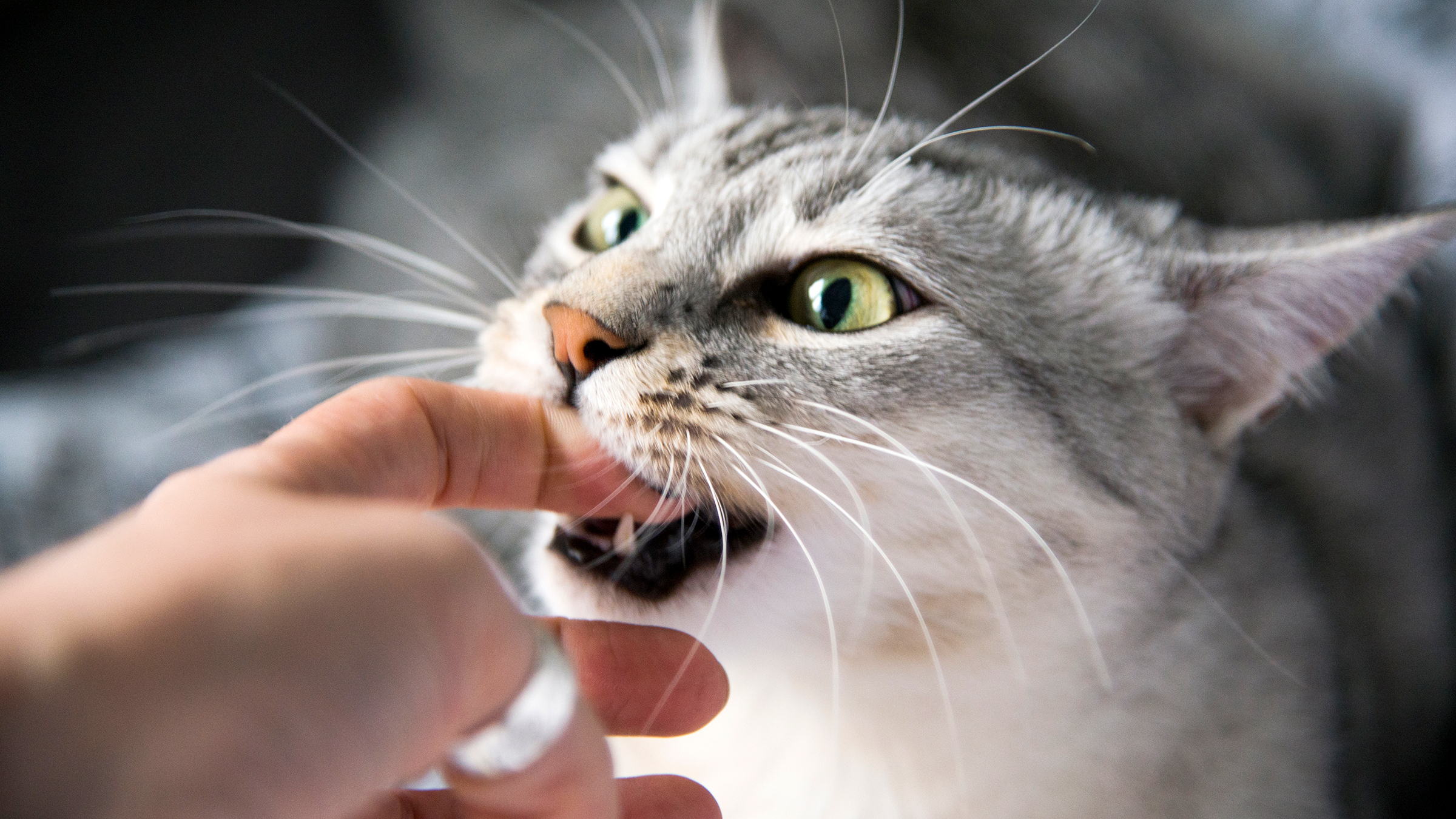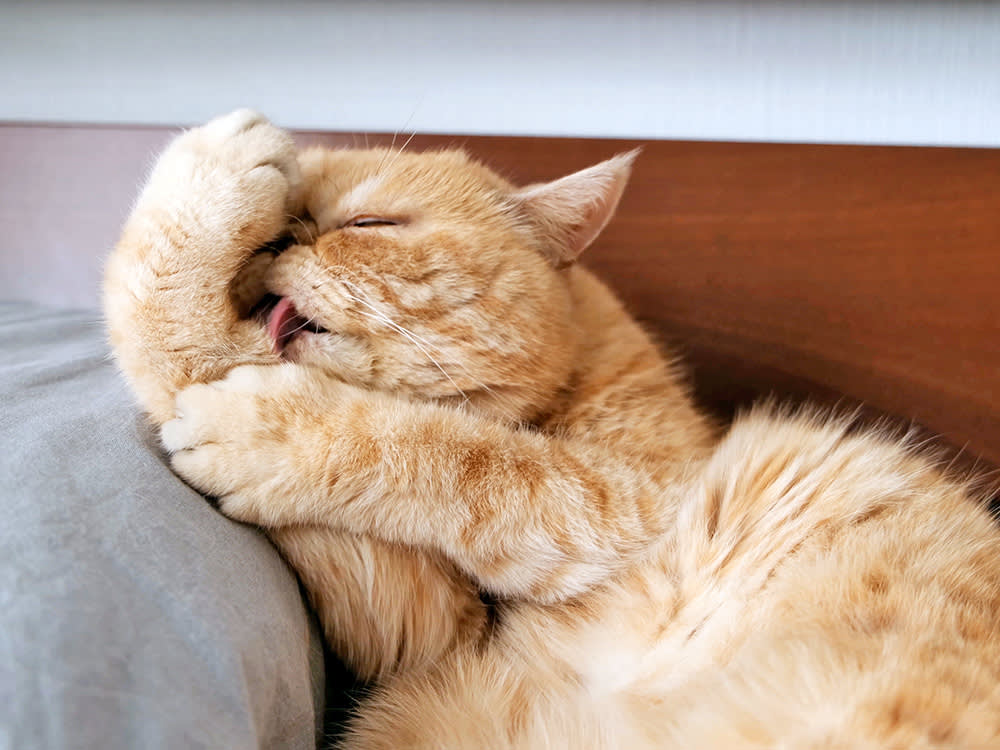Have you ever noticed your cat biting herself while grooming and wondered why? You’re not alone.
Many cat owners are puzzled by this peculiar behavior. It’s natural to be concerned and curious about what might be causing it. Understanding why your feline friend engages in this behavior is crucial, as it can affect her well-being and your peace of mind.
Could it be a harmless habit, or is there something more to it? Stick around as we dive into the possible reasons behind this behavior and what you can do to help your cat. Your furry companion deserves the best care, and knowing more about her grooming habits is a great place to start.

Credit: www.goodrx.com
Normal Grooming Habits
Cats spend a lot of time grooming themselves. This behavior is natural and important. Grooming helps cats stay clean and healthy. It also calms them and reduces stress. Understanding normal grooming habits helps spot any problems early.
How Cats Groom Themselves
Cats use their tongues to clean their fur. Their tongues have tiny, hook-like structures. These hooks remove dirt and loose hair. Cats lick their paws and rub their faces. They reach hard spots by bending their bodies. Grooming also spreads natural oils on their fur. This keeps the coat shiny and waterproof.
When Grooming Is Healthy
Healthy grooming is regular and gentle. Cats usually groom several times a day. Their fur looks clean and smooth. Skin under the fur is free of redness or sores. Grooming stops when the cat feels calm. It does not cause pain or injury. Over-grooming or biting can signal a problem.
Common Causes Of Self-biting
Noticing your cat biting herself while grooming can be concerning. Understanding the common causes behind this behavior helps you take the right steps to soothe your furry friend. Several issues can trigger self-biting, and spotting the right one often requires a closer look at your cat’s habits and environment.
Fleas And Parasites
Fleas are one of the top reasons cats bite themselves. These tiny pests cause intense itching and discomfort, pushing your cat to bite or scratch to find relief.
Even if you don’t see fleas right away, your cat might still be reacting to flea bites or other parasites like mites. Checking your cat’s fur regularly and using flea prevention treatments can make a huge difference.
Allergic Reactions
Allergies don’t just affect humans—they can bother your cat too. Food ingredients, pollen, or cleaning products might cause itchy skin or rashes, leading to self-biting.
If your cat suddenly starts biting more, consider whether anything in her environment or diet has changed. Sometimes a simple switch in food or a hypoallergenic shampoo can ease the problem.
Skin Infections
Skin infections, whether bacterial or fungal, can cause discomfort that makes your cat bite herself. These infections often appear as redness, swelling, or sores.
Left untreated, infections can worsen and spread. If you notice persistent biting along with changes in your cat’s skin, a vet visit is necessary to get the right treatment.
Dry Skin Issues
Dry skin can be surprisingly uncomfortable for cats, especially in colder months or dry climates. Your cat might bite or lick more to try to soothe the irritation.
Adding a humidifier or using a moisturizing pet-safe conditioner might help your cat’s skin feel better. Observing her environment and grooming habits can reveal if dryness is the culprit.
Behavioral Reasons
Behavioral reasons often explain why your cat might bite herself during grooming. Unlike simple cleaning, these actions can signal something deeper going on in her mind. Understanding these behaviors can help you address your cat’s needs more effectively.
Stress And Anxiety
Stress can cause your cat to over-groom and bite her skin. Changes in her environment, like moving to a new home or introducing a new pet, may trigger this behavior.
If you notice bald patches or sores, it might be her way of coping with anxiety. Have you observed any recent changes that could be unsettling for her?
Try creating a calm space with familiar scents and quiet areas. Using pheromone diffusers or engaging her in gentle play can reduce her stress levels significantly.
Boredom And Attention Seeking
Cats need mental and physical stimulation to stay happy. Biting herself might be your cat’s way of expressing boredom or trying to get your attention.
Think about how much interaction and playtime she gets daily. Could increasing these activities help redirect her focus?
Offering puzzle toys, interactive games, or even simple activities like laser pointers can keep her mind busy. This can reduce self-biting and strengthen your bond at the same time.
Medical Conditions Behind Biting
When your cat bites herself during grooming, it might be more than just a quirky habit. Sometimes, underlying medical conditions drive this behavior. Understanding these health issues can help you act quickly and keep your feline friend comfortable.
Pain Or Discomfort
Your cat might bite herself because she feels pain or discomfort in a specific area. This behavior often points to skin problems like allergies, infections, or wounds.
Imagine your cat constantly nibbling at a spot that’s itchy or sore—this is her way of trying to soothe herself. If you notice redness, swelling, or hair loss where she bites, it’s a clear sign to consult your vet.
Have you checked if your cat’s environment could be causing irritation? Dust, fleas, or harsh shampoos might be the hidden culprits behind her biting.
Neurological Disorders
Sometimes, self-biting can be linked to neurological disorders affecting your cat’s nerve function or brain activity. Conditions like neuropathy or seizures can cause abnormal sensations, prompting your cat to bite herself.
These disorders often come with other signs such as changes in behavior, unsteady walking, or unusual vocalizations. If your cat suddenly starts biting herself without visible skin issues, it’s worth discussing neurological causes with a vet.
Could your cat’s biting be a sign of something deeper? Pay close attention to any new or unusual behaviors alongside the biting to provide your vet with the best information.
Signs Of Excessive Grooming
Excessive grooming in cats can signal stress or health problems. It goes beyond normal cleaning and may harm your cat’s skin and fur. Recognizing signs early helps prevent serious issues. Watch for changes in fur and skin condition closely.
Hair Loss Patterns
Look for patches where fur is missing or thinning. These areas often appear on the belly, legs, or neck. Hair loss can be uneven or in small spots. Constant biting or licking causes these bald patches. Notice if your cat’s coat looks dull or uneven.
Skin Irritations And Wounds
Check for redness, swelling, or scabs on the skin. Irritated skin may appear dry or flaky. Wounds can form from repeated biting and scratching. These injuries may cause pain or discomfort. Your cat might lick these spots more often, worsening the damage.

Credit: www.reddit.com
How To Help Your Cat
Helping a cat that bites herself during grooming requires patience and care. Understanding the root cause is essential. Some cats bite themselves out of stress, discomfort, or skin problems. Providing the right support can improve your cat’s well-being and stop the biting habit.
Consulting A Veterinarian
A vet can identify health issues causing the biting. Skin infections, allergies, or pain may be the problem. The veterinarian will examine your cat’s skin and overall health. They may suggest tests or treatments to ease discomfort. Early consultation prevents further damage to your cat’s skin.
Improving Environment And Enrichment
Stress can trigger excessive biting. Create a calm and safe space for your cat. Provide toys and activities to keep her busy. Playtime helps reduce anxiety and boredom. A relaxed cat grooms less aggressively. Consistent routines make cats feel secure and less stressed.
Treating Parasites And Allergies
Parasites like fleas cause itching and biting. Use vet-approved flea treatments regularly. Allergies to food or environment also cause skin irritation. Identify allergens through vet advice and remove them. Treating these issues soothes your cat’s skin. Healthy skin means less biting and happier cats.

Credit: www.reddit.com
Frequently Asked Questions
Why Does My Cat Bite Herself During Grooming?
Cats bite themselves while grooming to remove dirt and loose fur. Sometimes, it may be due to irritation or stress. Biting helps them clean hard-to-reach areas and soothe itchy spots. However, excessive biting could signal skin problems or allergies needing veterinary attention.
Is It Normal For Cats To Bite While Grooming?
Yes, light biting is normal during grooming. Cats use gentle bites to clean their fur and skin. This behavior helps remove debris and stimulate blood flow. But if biting causes wounds or hair loss, it may indicate an underlying issue.
Can Cat Biting Herself Grooming Cause Injury?
Occasionally, biting can cause minor scratches or skin irritation. If a cat bites too hard or frequently, it may lead to wounds or infections. Owners should monitor for excessive biting and consult a vet if injuries or behavioral changes occur.
What Health Issues Cause Cats To Bite Themselves?
Skin allergies, parasites, infections, or anxiety can cause cats to bite themselves. These issues cause itchiness or discomfort, prompting biting during grooming. Identifying the root cause is essential for proper treatment and relief.
Conclusion
Cats bite themselves while grooming for many reasons. It can be normal behavior or a sign of discomfort. Sometimes, fleas, allergies, or skin problems cause biting. Watching your cat closely helps you spot issues early. If biting seems excessive, a vet visit is best.
Taking care of your cat’s skin and health keeps her happy. Understanding her grooming habits strengthens your bond. Keep your cat clean and comfortable for a healthy life.

